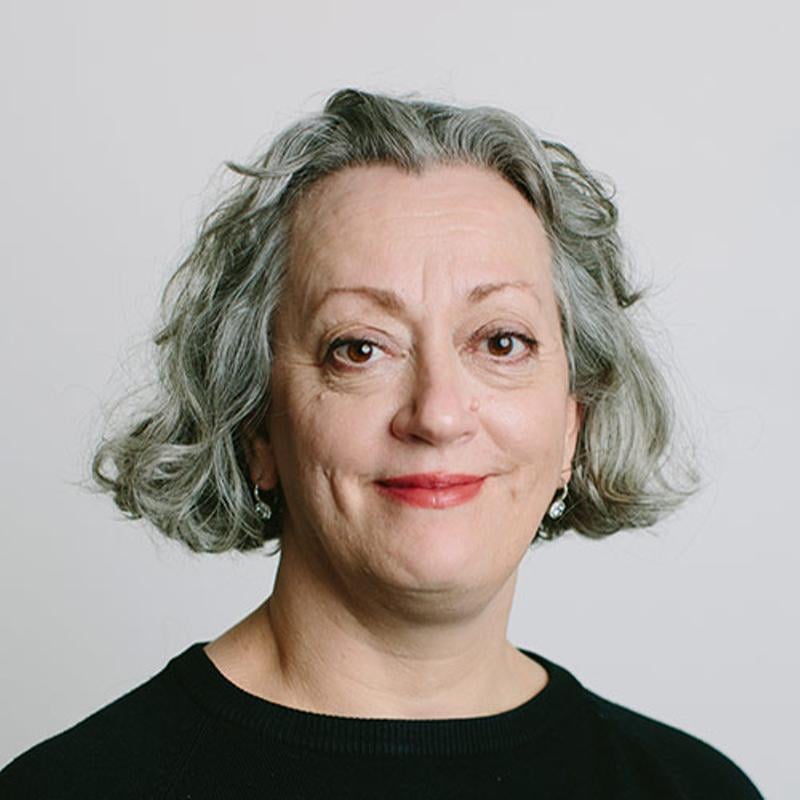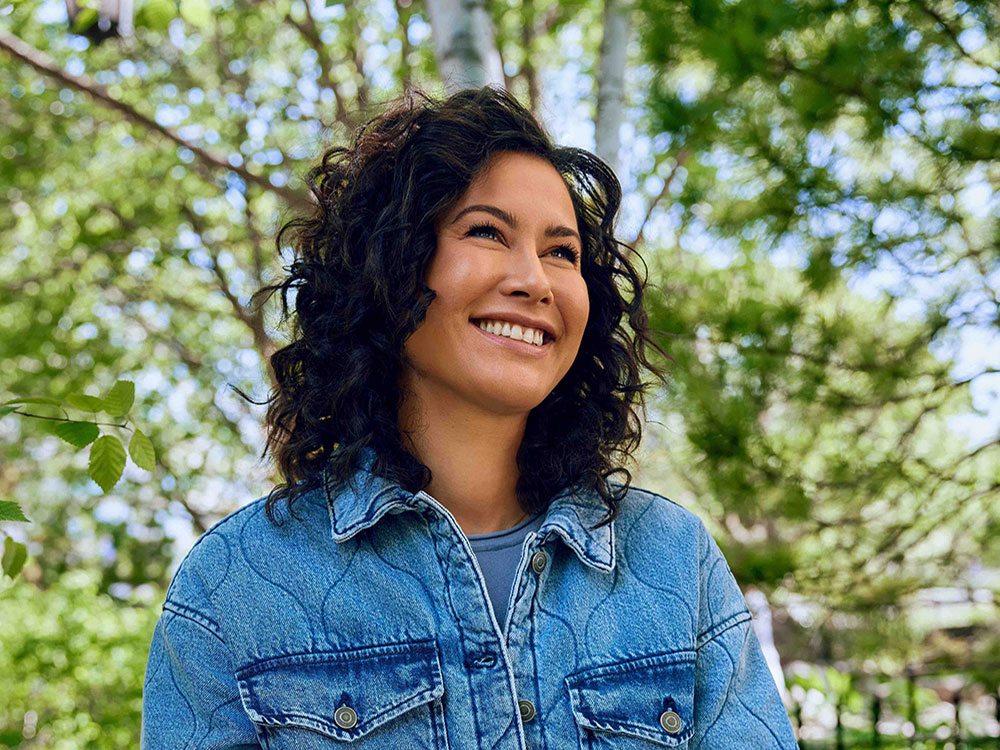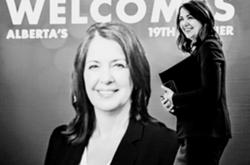CBC’s flagship science program, The Nature of Things, has been on the air for over 60 years. Acclaimed Vancouver-based science broadcaster and environmentalist David Suzuki hosted the show for more than 40. Next week on Jan. 11, the show welcomes two new co-hosts, Suzuki’s daughter Sarika Cullis-Suzuki and science communicator Anthony Morgan.
It is fitting that the evolution of the program launches with a film about, well, evolution. The Mystery of the Walking Whale takes as its subject how whales transformed from land-based, hoofed animals into the denizens of the deep. It is a circuitous journey both for the animals themselves and for the scientists who study them. With a PhD in marine biology, Cullis-Suzuki’s expertise shapes a deeply engaging presence onscreen, whether walking barefoot in the desert in search of fossils or interviewing other scientists.
Stepping into the shoes of her legendary father to take the hosting duties on The Nature of Things can seem a mite nerve-racking. But if ever there was a time when environmentalism and greater understanding of the natural world were needed, it is now.
On the eve of the show’s upcoming broadcast, The Tyee posed a few questions to Cullis-Suzuki about the upcoming episode as well as how she would like to see the show evolve. This interview has been lightly edited for length and clarity.
The Tyee: Given your background as a marine biologist, did some of the evolutionary twists and turns in the story of the walking whale take you by surprise?
Sarika Cullis-Suzuki: All of it was so fascinating! I don’t want to give any of it away, but some of the stuff we saw really made my jaw drop. It’s so rare to get the opportunity to “see evolution in action,” but this comes pretty close. We get to look at ancient skeletons through millions of years, and you see how these animals moved from being small, land-based creatures to aquatic goliaths of the sea.
Their bodies completely changed to suit their evolving environment in the span of about ten million years. You would never see a modern whale today and think, “Oh this must be related to an ancient rodent-like creature that had four legs, hoofs and webbed feet!” But once you start looking at their bones, things get interesting.
One of the things that I found especially fascinating about The Mystery of the Walking Whale film was the role of serendipity and chance (i.e. the discovery of the dense skull bone that indicated Pakicetus could hear underwater). Also, the relative speed in which evolutionary change can take place. Evolution is so amazing and so odd!
In the process of filming, were there aspects of the story that you would have liked to further explore?
That’s what’s so compelling about science. Nothing really ends with discovery: discovery just launches us into a million new questions!
But one of the things I wished we could have covered was the researchers themselves. Each of them had such a fascinating personal story.
In particular, there was one scientist named Shorouq Al-Ashqar who absolutely captivated me; she said paleontology saved her life.
Doing this work came at a real cost for her, conducting research and fieldwork in a heavily male-dominated discipline. But in the end, she triumphed, becoming one of the first-ever female vertebrate paleontologists in all of Egypt. Maybe this can be our next doc!
Does taking over the co-hosting duties from your dad on The Nature of Things feel like a natural progression in your work? Did you feel any trepidation about this role?
There were a lot of emotions this year, because first of all, Dad has been hosting this show since before I was born, so watching him step down was definitely a poignant moment.
Knowing that The Nature of Things has been on air for over 60 years, I mean, that’s quite the legacy and of course you don’t want to screw things up!
A tremendous amount of history and trust has been built up in this audience and you don’t want to let anyone down.
There is a great sense of support and creativity that comes with having a co-host, so I feel very lucky to have Anthony Morgan here alongside me in this role.
The opportunity to host The Nature of Things came at a turning point in my life. I had recently made the decision to step away from science and academia and move full time into media. This was in response to the urgency of the ecological crisis.
Media has its share of challenges, to be sure, but it is also immediate, and very accessible. Most people today have access to media in some form. The timing of this hosting opportunity was amazing. It really feels like a marrying of my passions: science, nature and communication.
As a parent and someone who is immersed in environmental study and information, what role does a program like The Nature of Things, with its legacy of making environmental stories immediate and accessible, offer a general audience? What would you like to accomplish with the program?
To me, what makes this show important and enduring is that it brings us into thoughtful conversations on science, the environment and our social obligations in a changing world. To me, these are the pillars of the show. In a one-hour program you can cover a lot of content. It really allows viewers to get immersed in a topic.
The show has new hosts, and we are trying some new things. For example, the show will be less scripted and more spontaneous. It’ll be less rehearsed and — for lack of a better word — a bit more “real.”
I think people are looking for authenticity, so while Anthony and I are hosts, we are also just real people asking real questions, which are driven by our real interests. I’m hoping this will resonate with people.
The shows will also often have an organic thread that binds the host with the topic, kind of a natural reason why we embark on each journey. And it’ll be a bit more personal. But while the faces and format of the show might be a bit different, I want to stress that the core principles of what makes The Nature of Things unique and valuable will remain.
Do you think the stories covered in the series have even greater relevance at this moment in time as we enter the Anthropocene, and arguably the sixth great mass extinction?
Yes! I definitely think the series is as important as ever, maybe even more important because of how we generally consume media today: in a fractured and shallow way. I believe we still crave long-form content and critical thinking, and the opportunity to reflect, but unfortunately, that isn’t prioritized in much of today’s media.
Science is such a powerful force, and it shapes our lives every day, and yet we often forget about it, or dismiss how it works; it is essential that we understand what science is but also what it’s not.
At the end of the day, we are animals that need basic necessities to survive: air, water, food, shelter and energy. We are quite literally embedded in nature’s web, and dependent on its health for our own.
And the health of each other: we are an incredibly social species that has succeeded through co-operation and community. Our shared human capacity is unbelievable. These things are worth remembering!
I am honoured to be part of a show that delivers evidence-based information, relates the power and indispensability of nature, and tackles the curiosities, complexities and challenges of life today. ![]()
Read more: Media, Science + Tech, Environment
















Tyee Commenting Guidelines
Comments that violate guidelines risk being deleted, and violations may result in a temporary or permanent user ban. Maintain the spirit of good conversation to stay in the discussion and be patient with moderators. Comments are reviewed regularly but not in real time.
Do:
Do not: